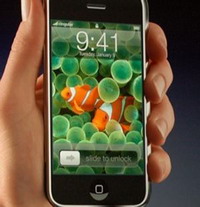Apple Inc to distribute iPhone in Europe
Europe, Britain is the first among the countries, will see Apple's iPhone.

The iPhone will go on sale in Britain on Nov. 9 through mobile operator O2, marking the first time the combination cell phone-iPod will be available outside the United States.
Consumers will pay 269 pounds (US$536, 386 EUR)for the 8-gigabyte model - or about US$139 more than what Apple charges in the United States. The iPhone offered in Britain will have the same technical specifications as the U.S. model, but the price includes the U.K.'s value-added tax.
The announcement immediately spurred speculation about more launches in Europe.
"We're announcing the U.K. today," said Apple CEO Steve Jobs. "We've said we'll be in a few countries in Europe next quarter. As we roll those out, I'm sure you'll hear about it."
Although Apple was coy, Deutsche Telekom AG said it planned to hold a news conference in Berlin on Wednesday. It did not give details, but Dow Jones Newswires reported that it would be the launch of the iPhone in Germany, Austria, the Netherlands, Hungary and Croatia.
For months, rumors have also circulated that Spain's Telefonica SA - the parent of O2 - and France's Orange would be tipped to offer the device in Spain and France. None of those companies has confirmed holding talks with Apple.
Jobs said Tuesday his goal was to sell 10 million iPhones in 2008, representing 1 percent of the global handset market. Apple announced last week that it had sold 1 million iPhones in the United States in the first 74 days it was on sale, shortly after also slashing the price by a third.
The company cut the 8-gigabyte iPhone from US$599 to US$399 (about 432 EUR to 288 EUR) and discontinued the US$499 (360 EUR) 4-gigabyte version. It apologized to those who had paid full price and offered US$100 (72 EUR) credits to early buyers.
Jobs, asked if he could offer any assurances against future price reductions, said that in technology there were no guarantees.
"There's always new models of things, there's always price reductions on old models," he said. "If you wait to buy something, always looking over the horizon, you'll never buy anything."
Jobs and O2 CEO Matthew Key refused to discuss either the terms or duration of their partnership, but British media reports said O2 paid a heavy price to win the deal.
The Guardian reported O2 agreed to share as much as 40 percent of the revenue it draws from iPhone customers. The newspaper said O2 will have to divide its share further with The Carphone Warehouse PLC, which - along with Apple stores and O2 retail outlets - will sell the device.
O2 is gambling on the iPhone as a way to rapidly expand its share of the British market's highest-value subscribers, said Ben Wood, director of telecom research company CCS Insight.
By accepting what could be unfavorable financial terms, O2 "stated today they were prepared to change the business model for this one-time opportunity," Wood said.
The iPhone will also force O2's competitors to fight to retain their most valued customers by offering them attractive terms for top-of-the-range phones from other handset makers, Woods said.
Jobs said the iPhone's ability to browse the Web and download music, TV shows and movies from iTunes will help it stand out in a market where consumers are accustomed to getting free or subsidized phones with their service contracts.
But analysts said in the long-term Apple could face a challenge.
"Being asked to pay 270 pounds for a phone, even a very smart phone, will be a culture shock," said Chris Green, editor of IT Pro, a trade magazine. "But given the Apple brand I think they might be able to get it to work."
The O2 contracts range from 35 pounds to 55 pounds (US$70-US$100) a month for services that include unlimited use of a Wi-Fi network with more than 7,500 hot spots. Over an 18-month contract, consumers will pay at least 899 pounds (US$1,798) for the iPhone and call packages.
Even as Jobs was touting the November launch, however, some of the journalists and analysts listening were already using modified iPhones bought in the U.S.
Apple sells the iPhone with software that won't work on other networks or in other countries, but hackers have already found out how to unlock it. Jobs said Apple was working on ways to beat the hackers.
"It's like a cat-and-mouse game, we try to stay a step ahead," Jobs said.
Subscribe to Pravda.Ru Telegram channel, Facebook, RSS!


